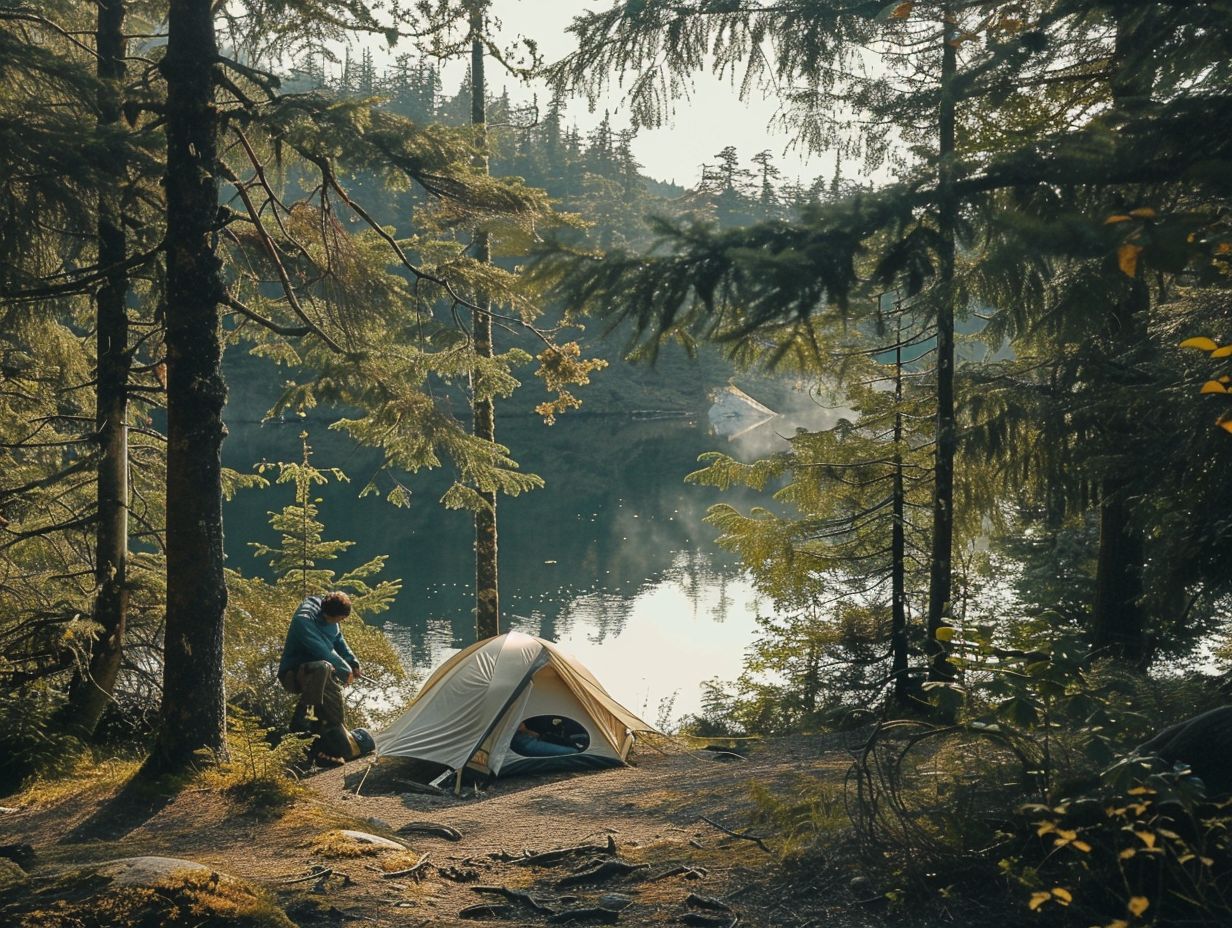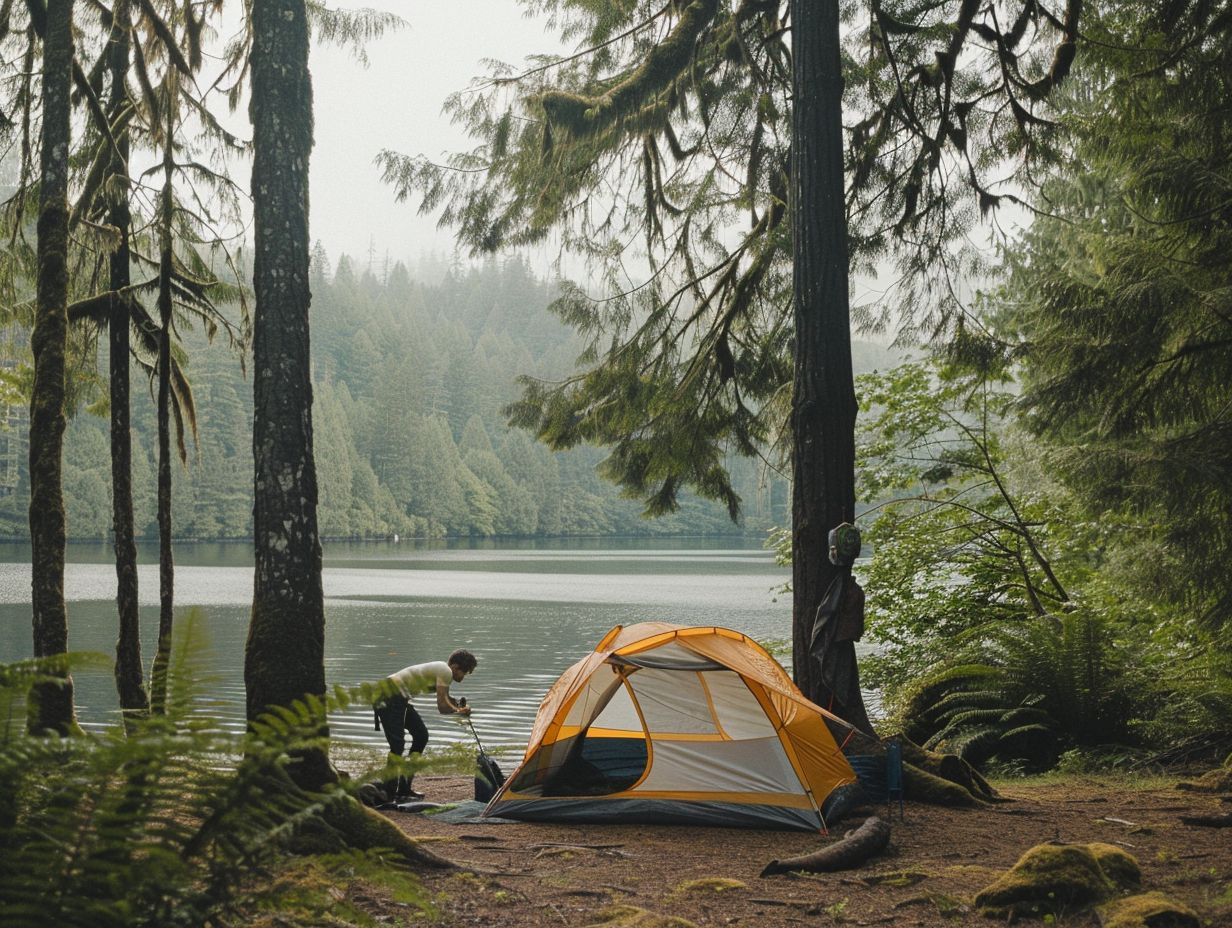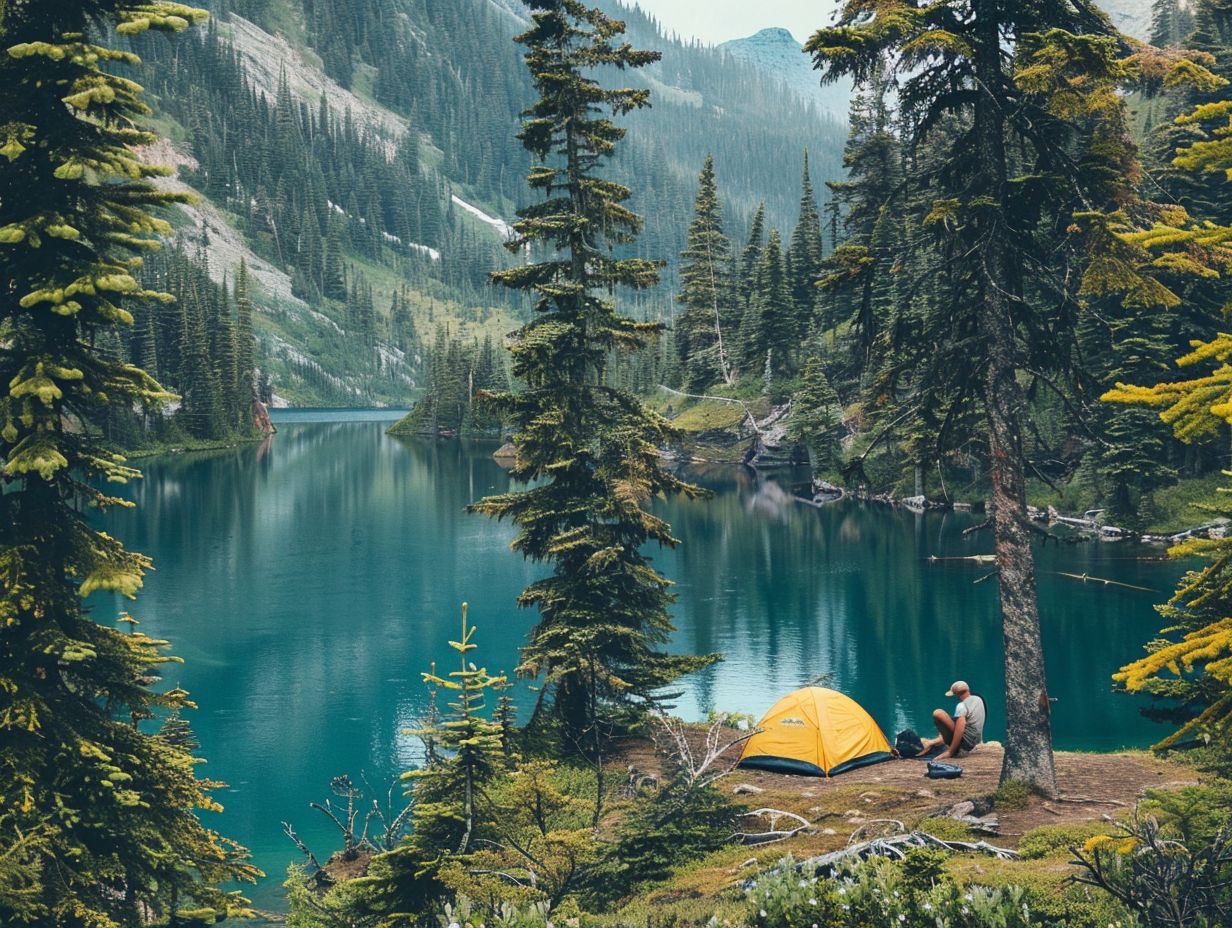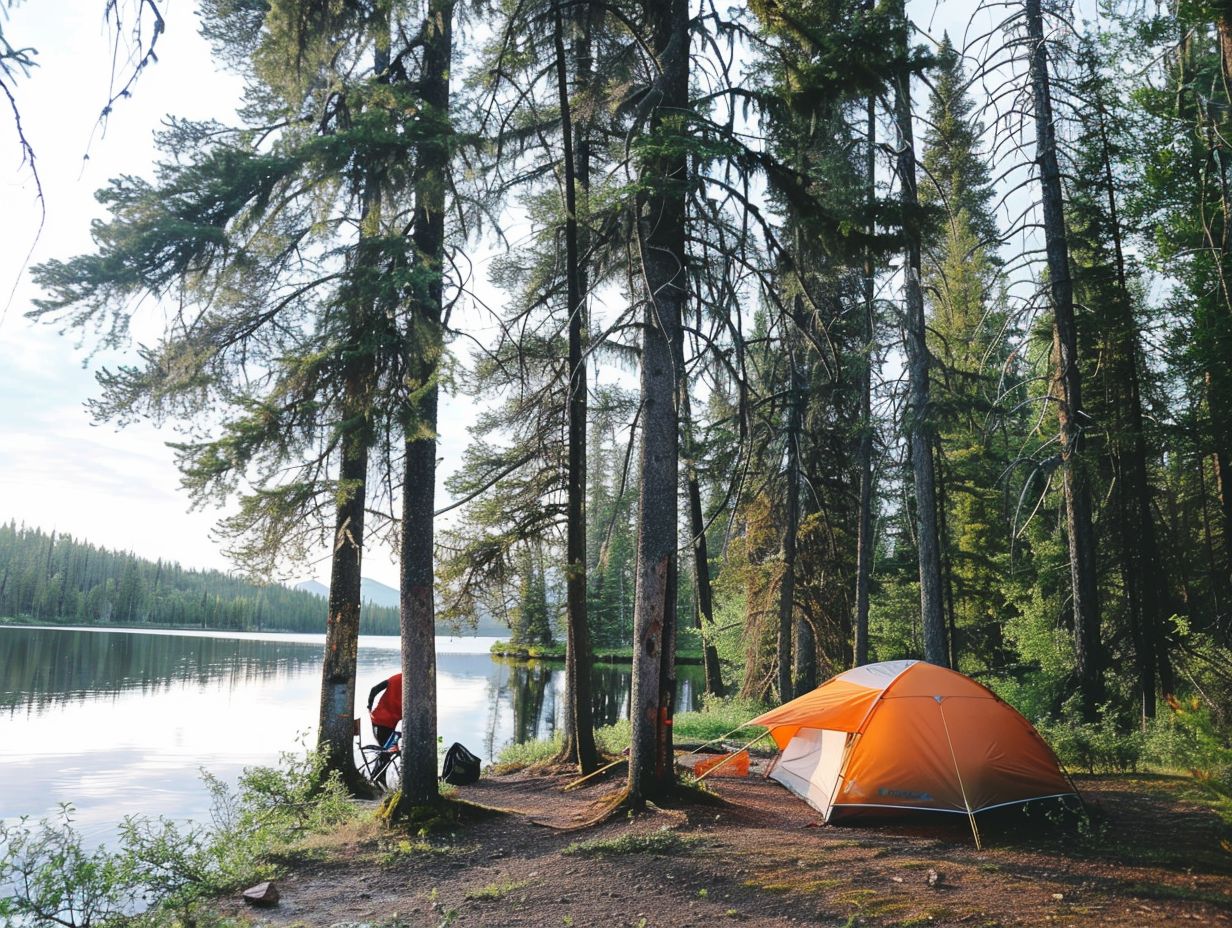Are you considering embarking on a solo camping adventure?
Whether you’re a seasoned outdoor enthusiast or a novice camper, there are key tips and strategies you should consider to ensure a successful and enjoyable experience.
This article covers everything you need to know for a successful solo camping trip, from planning ahead and choosing the right location to staying safe and connected while in the wilderness.
Discover the benefits of solo camping, potential risks, and valuable tips for overcoming fear and anxiety while camping alone.
Let’s dive in and make the most of your solo camping adventure!
Key Takeaways:

- Plan ahead and prepare to ensure a successful solo camping trip. Take time to research and pack essential gear, choose the right location, and have a plan for emergencies.
- Stay safe and connected by practicing leave no trace principles, staying hydrated and well-fed, and staying aware of your surroundings. Take time to relax and reflect on your experience.
- Overcome fear and anxiety by building confidence and taking necessary precautions. Keep your campsite clean and organized, and leave it better than you found it. Learn from your solo camping experience for future trips.
1. Plan Ahead and Prepare
When embarking on a solo camping adventure, thorough planning and preparation are essential for ensuring a safe and enjoyable experience in the great outdoors.
It is crucial for you to meticulously plan out your itinerary, taking into account factors such as location, duration of stay, and potential hazards in the area.
Checking and double-checking your equipment, ensuring everything is in working order, can make a significant difference in the success of your trip.
Establishing emergency protocols, including informing a trusted contact of your whereabouts and expected return, adds an extra layer of safety.
Using GPS devices for navigation is a smart way for you to stay on course and avoid getting lost, especially in unfamiliar terrain.
Remember, following Leave No Trace principles is vital to protect the environment and preserve the beauty of nature for future generations to enjoy.
2. Choose the Right Location
When selecting the ideal location for solo camping, you should consider various factors. Whether you prefer the serene beauty of National Parks, the rustic charm of State Parks, or LGBTQ+-friendly campgrounds that offer a welcoming environment for all, your choice can greatly impact your camping experience.
National Parks offer a diverse range of landscapes, from mountains to deserts, allowing solo campers to fully immerse themselves in nature. On the other hand, State Parks often provide well-maintained facilities and access to water activities, catering to those who seek a balance between adventure and comfort.
Opting for LGBTQ+-friendly campgrounds can foster inclusivity, creating a supportive community and a safe environment for solo campers, irrespective of their background.
Prioritising safety, accessibility, and inclusivity in your camping site selection is essential to ensure a rewarding and secure solo camping experience.
3. Pack Light and Efficiently
When optimising your packing strategy for solo camping, you should focus on packing light and efficiently, especially when heading into the backcountry where every item, from your solo camping gear to camping tables, needs to have a purpose.
In preparation for your solo camping trip, prioritise lightweight and versatile equipment to enhance mobility and convenience. Opt for tools and gear that can serve multiple functions, reducing the overall weight of your pack.
It is advisable to choose high-quality, durable items that are lightweight and compact to save space and energy during your hike to the campsite. Pack only essential items necessary for your trip to minimise unnecessary weight and clutter in your backpack.
By streamlining your gear selection and opting for items with multiple uses, you can experience a more comfortable and efficient camping adventure.
4. Bring Essential Gear and Supplies
When preparing for solo camping, ensure you are equipped with the necessary camping gear and supplies. Essential items like Bear Spray and an Emergency Car Jump Starter are crucial for handling a variety of situations in the wilderness.
Additionally, consider carrying other important safety items such as a first aid kit, a multi-tool for repairs, a reliable torch with extra batteries, and a portable water filter for ensuring access to clean drinking water.
Being self-sufficient entails having an adequate supply of food, water, and clothing to address unexpected circumstances. It’s imperative to have high-quality camping essentials like a tent, sleeping bag, and camping stove to ensure a comfortable and safe camping experience.
Conduct thorough research on the camping area and make sure to have a detailed map or GPS device for navigating the terrain effectively. By being well-prepared with the right equipment and knowledge, you can enjoy the solitude and adventure of solo camping with confidence and peace of mind.
5. Set Up Camp Safely
When you are solo camping, it is essential to establish a safe campsite, especially in remote backcountry areas. Tools such as a Personal Locator Beacon or Garmin InReach Mini can be crucial for communication and emergency assistance in such locations.
The first step is to choose the right site. Look for level ground that is away from potential hazards like dead trees or rocky outcrops. Once you have identified a suitable spot, ensure to pitch your tent securely to provide protection from the elements.
Using the appropriate knots for stability is important, and remember to secure your rainfly to prepare for sudden weather changes.
It is recommended to include setting up communication devices like a Personal Locator Beacon in your routine safety checklist for any solo camping expedition.
6. Be Aware of Your Surroundings
Maintaining awareness of your surroundings is crucial for solo campers. It allows you to remain vigilant and prepared for potential risks while ensuring you have essential items such as Pepper Spray and Satellite Messengers for added safety.
Being alert to wildlife encounters is essential when camping alone, as unexpected interactions with animals can be dangerous. Unforeseen weather changes can also make navigation difficult, highlighting the importance of knowing your route and having contingency plans in place.
By staying mindful of these factors, solo campers can reduce risks and have a safer outdoor experience. Investing in protective measures like Pepper Spray for wildlife defence and Satellite Messengers for emergency communication further improves your readiness in the wilderness.
7. Practice Leave No Trace Principles

Adhering to Leave No Trace principles is a fundamental aspect of responsible solo camping. It serves as a guideline for promoting environmental stewardship and demonstrating respect for nature. By following these principles, solo campers can effectively minimise their impact on the environment.
This includes practices such as packing out all rubbish, minimising campfire impacts, and showing respect towards wildlife. Not only does this help in preserving the natural beauty of outdoor areas, but it also encourages a sense of mindfulness and connection with the environment.
Cultural sensitivity is paramount during solo camping, particularly for BIPOC outdoor enthusiasts who may encounter unique challenges or concerns regarding access, representation, and safety.
Embracing inclusivity and advocating for diversity in outdoor spaces is essential for fostering a welcoming and equitable outdoor community for all individuals, regardless of background or identity. This approach ensures that future generations, including BIPOC communities, can enjoy and appreciate pristine wilderness areas.
8. Stay Hydrated and Well-Fed
Maintaining proper hydration and nutrition is essential for solo campers like yourself to sustain your energy levels and overall well-being during outdoor adventures, ensuring a healthy and enjoyable camping experience.
When you head out on a solo camping trip, it is crucial to pack enough water to stay hydrated throughout your journey. An average adult like yourself should aim to consume at least 2 liters of water per day, and even more in hot weather or during strenuous activities. Opt for a reusable water bottle or hydration pack to make it easier for you to access water while on the move.
Consider bringing nutrient-dense foods like nuts, dried fruits, jerky, and energy bars to keep your energy levels up during hikes and other physical activities.
9. Have a Plan for Emergencies
Being prepared for emergencies is crucial in solo camping. You need to create a thorough emergency plan that includes communication protocols, emergency contacts, and the use of tools like a Personal Locator Beacon for distress situations.
Plus having a robust emergency plan, you should familiarise yourself with basic first aid techniques to address injuries or illnesses that may occur while in the wilderness.
It is essential to pack necessary supplies such as a first aid kit, emergency shelter, food, and water to sustain yourself until help arrives. Understanding how to read a map and use a compass can be extremely valuable when navigating through unfamiliar terrains in case you become lost during your trip.
10. Know How to Build a Fire
Mastering the skill of building a fire is critical for solo campers like yourself, as it offers warmth, light, and a sense of security in the wilderness, making it an essential survival skill for outdoor enthusiasts.
When embarking on a solo camping trip, it is crucial to begin by selecting a safe location for your campfire. Ensure that the location is away from overhanging branches, dry grass, or any flammable materials. Once you have identified a suitable spot, gather three types of fuel: tinder, kindling, and larger wood logs.
Start by arranging the tinder material such as dry leaves, bark, or small twigs in the centre, then progressively build up with kindling and finally larger logs. To ignite the fire, use methods like a lighter, matches, or a flint and steel.
Make sure to have these tools in your camping kit. Remember never to leave the fire unattended and always keep a water source nearby to extinguish any potential flare-ups.
11. Keep Your Campsite Clean and Organized.
Maintaining a clean and organised campsite is not only a matter of convenience but also a responsible practice for solo campers, contributing to a harmonious and enjoyable outdoor environment for themselves and future visitors.
By properly managing waste through techniques such as packing out all rubbish, burying human waste at least 200 feet from water sources, and following ‘Leave No Trace’ principles, you can minimise your impact on the natural surroundings.
Adhering to campsite etiquette like keeping noise levels down, respecting wildlife, and minimising campfire impacts further enhances your overall experience.
Leaving a campsite in better condition than when you arrived not only demonstrates good stewardship of the environment but also sets a positive example for others to follow, fostering a culture of conservation and appreciation for the great outdoors.
12. Stay Connected with Loved Ones
Maintaining communication with loved ones while solo camping is essential for your peace of mind and safety. Utilise tools like GPS and Satellite Messengers to stay connected and provide updates on your well-being.
It is recommended that you have regular check-ins with family or friends to ensure that someone is informed about your whereabouts and well-being during your camping trip. Sharing details of your itinerary, including planned camping spots and estimated return date, can be beneficial in case of emergencies.
Utilise technology such as GPS trackers and Satellite Messengers for immediate communication in unforeseen situations. By staying connected through these methods, you can enhance your solo camping experience with added security and peace of mind.
13. Take Time to Relax and Enjoy Nature
Solo camping provides you with a unique opportunity to unwind, recharge, and immerse yourself in the beauty of nature, fostering relaxation and rejuvenation amidst serene outdoor surroundings. Stepping away from the hustle and bustle of daily life, you can truly disconnect from the noise of technology and responsibilities.
By setting up camp in a peaceful natural setting, you can find solace in the simplicity of the natural world, allowing for introspection and a sense of freedom.
Embracing the tranquillity of nature opens the door to mindfulness practices, such as meditation and yoga, which can enhance self-awareness and promote mental clarity.
Through these experiences, you can gain a deeper appreciation for the therapeutic benefits that outdoor adventures offer for mental well-being and stress relief.
14. Leave the Campsite Better Than You Found It

As a responsible steward of the environment, you should prioritise leaving your campsite in a pristine condition, adhering to Leave No Trace principles, and showcasing your dedication to environmental conservation for future generations.
To minimise your ecological footprint, it is crucial to abide by local regulations regarding fire usage, stick to designated trails to prevent damage to vegetation, and refrain from collecting natural materials.
By packing out all waste, you can guarantee that no harm befalls the wildlife and ecosystem surrounding your campsite. Respecting wildlife habitats involves maintaining a safe distance, abstaining from feeding animals, and avoiding loud noises that could disrupt their natural behaviour.
You can actively contribute to the preservation of natural landscapes by engaging in trail maintenance projects or offering your volunteer services to conservation organisations.
15. Reflect on Your Experience and Learn from It
Engaging in self-reflection and learning from your solo camping experience is a valuable practice that allows you to grow, adapt, and enhance your outdoor skills, fostering personal development and a deeper connection with nature.
Journalling about the challenges you face during solo camping not only helps in processing your emotions but also serves as a reflection tool for strategizing future trips.
By documenting your successes and failures, you can identify patterns, strengths, and areas for improvement. This analytical approach enables you to gain valuable insights into your outdoor capabilities and refine your skills over time.
Embracing the journey of continuous learning in outdoor pursuits leads to a more fulfilling and enriching camping experience.
What Are the Benefits of Solo Camping?
Embarking on a solo camping adventure offers you a myriad of benefits, including solitude, self-reliance, personal growth, and the opportunity to disconnect from the distractions of daily life. This experience allows you to forge a deeper connection with yourself and nature.
Being in nature alone provides you with a unique space for introspection and self-discovery. The quiet surroundings and absence of external influences create a fertile environment for exploring your thoughts and emotions. Through this introspective process, you can gain a better understanding of yourself, fostering a sense of inner peace and clarity.
Solo camping cultivates resilience as you learn to navigate challenges independently, which boosts your confidence and sense of accomplishment.
Overcoming obstacles in the wilderness translates to increased resilience in facing life’s hurdles with courage and determination. The simplicity of solo camping allows for a reduction in stress levels as you embrace a slower pace of living, tuning into the present moment and letting go of worries.
Immersing yourself in nature and detaching from technology and societal pressures during solo camping can be incredibly rejuvenating, offering a mental reset and a chance to recharge.
The give the power toment that comes from successfully managing the demands of solo camping can have a lasting impact, instilling a sense of self-assurance and give the power toment that carries over into everyday life.
What Are the Potential Risks of Solo Camping?
When engaging in solo camping, you are faced with various risks, including isolation, medical emergencies, wildlife encounters, and adverse weather conditions. This underscores the critical importance of preparation, caution, and situational awareness for solo campers.
For your safety, it is imperative that you prioritize certain precautions. Inform someone about your planned route and expected return time before embarking on your solo camping trip.
Additionally, carry a well-equipped first aid kit, emergency supplies, and a reliable means of communication, such as a satellite phone or locator beacon.
To enhance your safety and preparedness, ensure you are knowledgeable about basic wilderness survival skills, like constructing a shelter and starting a fire.
Conduct thorough research on the area you plan to camp in, understand the behaviors of local wildlife, and adhere to Leave No Trace principles to mitigate risks and improve your overall camping experience.
How Can One Overcome Fear and Anxiety When Camping Alone?
Overcoming fear and anxiety during solo camping involves building confidence, honing outdoor skills, practising mindfulness, and developing a positive mindset, give the power toing you to embrace solitude and navigate challenges with resilience and self-assurance.
An effective strategy is to incorporate visualization exercises into your daily routine, mentally rehearsing scenarios that may trigger fear in a controlled environment. This can help desensitize you to those situations and build your confidence in handling them.
Practising deep breathing techniques during moments of stress or unease can help calm your mind and regulate emotions, allowing for clearer thinking and decision-making in challenging situations.
Gradual exposure to unfamiliar settings, such as spending short periods alone in secluded spots, can also help you acclimatize to the inherent uncertainties of solo camping, gradually enhancing your mental fortitude and self-reliance.
What Are Some Tips for Staying Safe While Solo Camping?
Ensuring safety during solo camping requires attention to detail, situational awareness, emergency preparedness, and the use of safety equipment such as Pepper Spray, Bear Spray, and Personal Locator Beacons. These measures give the power to you to mitigate risks and enjoy your outdoor adventures with confidence.
Being aware of your surroundings is crucial when camping alone, as it can help you anticipate and react to potential wildlife encounters. Keeping a close eye on the terrain and any signs of animal activity can prevent surprises.
Honing navigation skills is essential for finding your way back to camp or to safety in case of an emergency. Understanding basic first aid techniques and carrying a well-equipped first aid kit can also make a significant difference in handling injuries or medical emergencies.
Establishing communication protocols for check-ins with loved ones or emergency contacts can provide peace of mind and ensure quick responses in case of unforeseen situations.
How Can One Make the Most of Their Solo Camping Trip?
Maximise the enjoyment of your solo camping trip by immersing yourself in nature and embracing solitude. Try new activities and foster a sense of curiosity and exploration to create memorable experiences and meaningful connections with the environment.
Enhance your solo camping adventure by fully engaging in nature immersion. Tune into the intricate details of the surrounding flora and fauna, listen to the soothing sounds of the wilderness, and observe the endless play of light and shadows.
Deepen your connection to the natural world by engaging in mindfulness practices such as meditation, deep breathing, or mindful walking. This can promote a sense of inner peace and rejuvenation.
Incorporate activities like wildlife observation, stargazing, journaling, or photography to spark creativity and provide avenues for capturing the essence of the outdoors.
Frequently Asked Questions

What safety measures should I take for a successful solo camping trip?
Some safety measures to take for a successful solo camping trip include informing friends or family about your trip, bringing a first aid kit and emergency supplies, and being aware of your surroundings.
How can I plan and prepare for a successful solo camping trip?
To plan and prepare for a successful solo camping trip, research the location, pack appropriate supplies, and make a checklist of essential items to bring. It is also important to check the weather forecast and plan accordingly.
What are some important items to bring on a successful solo camping trip?
Some important items to bring on a successful solo camping trip include a tent, sleeping bag, cooking utensils, food and water, a map and compass, and a flashlight or headlamp.
How can I stay safe and avoid feeling lonely during a solo camping trip?
To stay safe and avoid feeling lonely during a solo camping trip, choose a well-populated camping spot, stay connected with friends or family, and bring activities such as books or games to keep yourself entertained.
What are some tips for setting up camp during a solo camping trip?
Some tips for setting up camp during a solo camping trip include choosing a flat and level spot, setting up the tent before it gets dark, and securing your belongings to prevent them from blowing away or attracting animals.
How can I stay organized during a solo camping trip?
To stay organized during a solo camping trip, pack items in separate bags or containers, label them clearly, and make a checklist to keep track of items. It is also helpful to clean up and put things away immediately after use.



